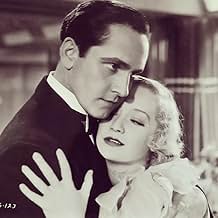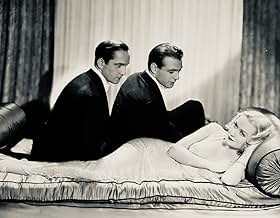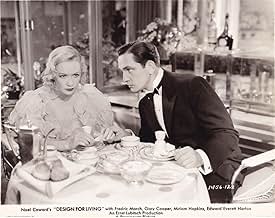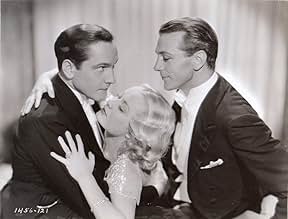IMDb-BEWERTUNG
7,4/10
8266
IHRE BEWERTUNG
Eine Frau kann sich nicht zwischen zwei Männern entscheiden, die sie lieben. Das Trio beschließt, in einer platonischen Freundschaftsbeziehung zusammenzuleben.Eine Frau kann sich nicht zwischen zwei Männern entscheiden, die sie lieben. Das Trio beschließt, in einer platonischen Freundschaftsbeziehung zusammenzuleben.Eine Frau kann sich nicht zwischen zwei Männern entscheiden, die sie lieben. Das Trio beschließt, in einer platonischen Freundschaftsbeziehung zusammenzuleben.
- Regie
- Drehbuch
- Hauptbesetzung
- Auszeichnungen
- 3 wins total
Cosmo Kyrle Bellew
- Man
- (Nicht genannt)
Lionel Belmore
- Theatre Patron
- (Nicht genannt)
Thomas Braidon
- Douglas' Second Manager
- (Nicht genannt)
Nora Cecil
- Tom's Secretary
- (Nicht genannt)
Emile Chautard
- Train Conductor
- (Nicht genannt)
Mathilde Comont
- Heavy Woman
- (Nicht genannt)
Adrienne D'Ambricourt
- Cafe Proprietress
- (Nicht genannt)
James Donlan
- Fat Man with Ring
- (Nicht genannt)
Harry Dunkinson
- Mr. Egelbauer
- (Nicht genannt)
Estelle Etterre
- Woman in audience
- (Nicht genannt)
Empfohlene Bewertungen
Delightful even if more Ben Hecht than Noel Coward. The "menage a trois" has real brains, wit and magic. All due to the sensational chemistry between Gary Cooper, Fredric March, Miriam Hopkins and, of course, the unmistakable Lubitch touch. I was going to say that the film seems written today but the sad truth is there is nobody today that could write with this extraordinary elegance. Frediric March is masculine and volcanic, Gary Cooper feminine and irresistible and Miriam Hopkins, a sensational modern comedienne. As if this wasn't enough, Edward Everett Horton as Mr Wrong. The scene in which Hopkins compares Cooper and March to hats is one of my all time favorites.
While traveling through France, the playwright Thomas B. 'Tom' Chambers (Fredric March) and his best friend, the painter George Curtis (Gary Cooper) meet Gilda Farrell (Miriam Hopkins) and they fall in love with her. Gilda is "protected" by the wealthy Max Plunkett (Edward Everett Horton) and Tom and George are losers, but she cannot decide between them who could be her boyfriend. So she proposes a gentleman's agreement where they would be friends without having sex. She decides to criticize their works and they become successful. But will their platonic relationship work?
"Design for Living" is a movie with a female character ahead of time. Actually the sexy story is a Pre-Code Hollywood that became effective 01 July 1934. The plot has sexual freedom, adultery and even a possible threesome but is naive in the present days. There are many funny situations and this movie is a delightful entertaining. My vote is seven.
Title (Brazil) "Sócios no Amor" ("Partners in Love")
"Design for Living" is a movie with a female character ahead of time. Actually the sexy story is a Pre-Code Hollywood that became effective 01 July 1934. The plot has sexual freedom, adultery and even a possible threesome but is naive in the present days. There are many funny situations and this movie is a delightful entertaining. My vote is seven.
Title (Brazil) "Sócios no Amor" ("Partners in Love")
I'm not a big fan of the Lubitsch Touch. This, which I hadn't seen in 20 years, I think is my favorite.
The recent Broadway revival of the Noel Coward play, which was supposedly very ooh-la-la and daring, was a bust. Interminable and misguided.
One problem was that the female lead was made very cold. In the movie, Miriam Hopkins is just right: pretty, seductive, witty.
Gary Cooper is sublime. He was a great comedian -- equally good in "Desire," the delightful movie with Dietrich that Lubitsch produced and supposedly had a big hand in directing. Too bad he changed gears so drastically and became the strong, silent Western hero he's known for today (if he's known at all, alas.)
Fredric March was a very fine actor but not a comedian. He is the weakest link; but he works well in the ensemble.
Edward Everett Horton is funny, as always.
It really works, and is as racy today as it must have been when it came out.
The recent Broadway revival of the Noel Coward play, which was supposedly very ooh-la-la and daring, was a bust. Interminable and misguided.
One problem was that the female lead was made very cold. In the movie, Miriam Hopkins is just right: pretty, seductive, witty.
Gary Cooper is sublime. He was a great comedian -- equally good in "Desire," the delightful movie with Dietrich that Lubitsch produced and supposedly had a big hand in directing. Too bad he changed gears so drastically and became the strong, silent Western hero he's known for today (if he's known at all, alas.)
Fredric March was a very fine actor but not a comedian. He is the weakest link; but he works well in the ensemble.
Edward Everett Horton is funny, as always.
It really works, and is as racy today as it must have been when it came out.
For me, of course, there would be no choice. A young Gary Cooper - talk about a dream walking.
Noel Coward's "Design for Living" was a play Coward wrote for himself and Lunt and Fontanne to star in, concerning a woman, Gilda, who can't decide between two young men and best friends in love with her, Tom and George.
So the three decide to live together platonically. Tom leaves to work on his play, and while he's away, George and Gilda sleep together. Later on, alone with Tom, she sleeps with him, and George catches them together. Then Gilda makes a decision.
Only one line from the original play was retained for the film. Though it is precode, the sex is inferred. Given the Lubitsch touch, it's a delightful, sexy comedy with pretty Miriam Hopkins as the winsome Gilda, Fredric March as Tom, a playwright, and Gary Cooper as George, an artist.
The three young, attractive actors under Lubitsch's direction really make the film and situation sing.
March was never much for comedy, though he does an okay job. Hopkins was a wonderful actress with many Broadway credits before getting into films, and Cooper was just so darned gorgeous I have no idea how he was except my impression is that he was very good. Had I been Hopkins - no choice! A charming film.
Noel Coward's "Design for Living" was a play Coward wrote for himself and Lunt and Fontanne to star in, concerning a woman, Gilda, who can't decide between two young men and best friends in love with her, Tom and George.
So the three decide to live together platonically. Tom leaves to work on his play, and while he's away, George and Gilda sleep together. Later on, alone with Tom, she sleeps with him, and George catches them together. Then Gilda makes a decision.
Only one line from the original play was retained for the film. Though it is precode, the sex is inferred. Given the Lubitsch touch, it's a delightful, sexy comedy with pretty Miriam Hopkins as the winsome Gilda, Fredric March as Tom, a playwright, and Gary Cooper as George, an artist.
The three young, attractive actors under Lubitsch's direction really make the film and situation sing.
March was never much for comedy, though he does an okay job. Hopkins was a wonderful actress with many Broadway credits before getting into films, and Cooper was just so darned gorgeous I have no idea how he was except my impression is that he was very good. Had I been Hopkins - no choice! A charming film.
This was one of the movies I was so sure was going to be stupid and annoying but it turned out to be such fine comedy I've already watched it three times in the past week or two. So many good lines. Tom writes a play called Goodnight Bassington - a comedy in about three acts with a tragic ending. George paints Lady Godiva on a bicycle, despite the fact that a bicycle seat IS a little hard on her historical background. Gilda says that she went to see the above-mentioned painting of Lady Godiva with a friend. "She loved it. We haven't spoken since," Gilda tells George, who begins to pout. He does a fair amount of pouting throughout the film.
Eaglebauer also makes for some fine humour in some scenes near the end, but we never get to see the man. We only hear him bellowing out a joyous song about "falling leaves and fading trees! Goodbye, summer, goodbye!"
But besides all that this really wacky movie is a delight and I sure wish they'd re-release it because it's so good.
So. There's only one thing I have to say to you. Immorality may be fun, but it's not fun enough to replace one hundred per cent virtue and three square meals a day.
Eaglebauer also makes for some fine humour in some scenes near the end, but we never get to see the man. We only hear him bellowing out a joyous song about "falling leaves and fading trees! Goodbye, summer, goodbye!"
But besides all that this really wacky movie is a delight and I sure wish they'd re-release it because it's so good.
So. There's only one thing I have to say to you. Immorality may be fun, but it's not fun enough to replace one hundred per cent virtue and three square meals a day.
Wusstest du schon
- WissenswertesConsiderable censorship difficulties arose because of sexual discussions and innuendos, although the Hays Office eventually approved the film for release. However, the film was banned by the Legion of Decency and was refused a certificate for re-release by censor Joseph Breen in 1934 when the Production Code was more rigorously enforced.
- PatzerCamera shadow visible on window frame as Gilda sets the table.
- Zitate
Max Plunkett: Immorality may be fun, but it isn't fun enough to take the place of one hundred percent virtue and three square meals a day.
- VerbindungenFeatured in Complicated Women (2003)
- SoundtracksThe Star Spangled Banner
(1814) (uncredited)
Music by John Stafford Smith
Hummed by Gary Cooper and Fredric March
Top-Auswahl
Melde dich zum Bewerten an und greife auf die Watchlist für personalisierte Empfehlungen zu.
Details
- Erscheinungsdatum
- Herkunftsland
- Sprachen
- Auch bekannt als
- Una mujer para dos
- Drehorte
- Produktionsfirma
- Weitere beteiligte Unternehmen bei IMDbPro anzeigen
Box Office
- Weltweiter Bruttoertrag
- 157 $
- Laufzeit1 Stunde 31 Minuten
- Farbe
- Seitenverhältnis
- 1.33 : 1
Zu dieser Seite beitragen
Bearbeitung vorschlagen oder fehlenden Inhalt hinzufügen

Oberste Lücke
By what name was Serenade zu dritt (1933) officially released in India in English?
Antwort





































